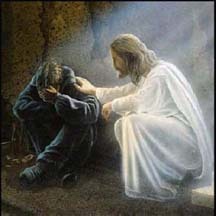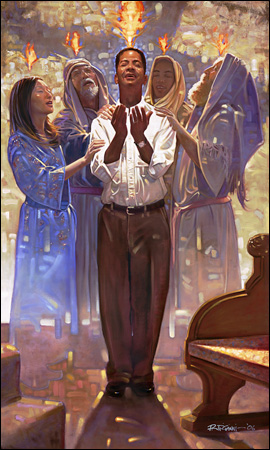
-08-09-2024-
vs.31. Returning from the district of Tyre, Jesus went by way of Sidon towards the Sea of Galilee, right through the Decapolis region.
vs.32. And they brought him a deaf man who had an impediment in his speech; and they asked him to lay his hand on him.
vs.33. He took him aside in private, away from the crowd, put his fingers into the man’s ears and touched his tongue with spittle.
vs.34. Then looking up to heaven he sighed; and he said to him,
“Ephphata“, that is “Be opened.“
vs.35. And his ears were opened, and the ligament of his tongue was loosened and he spoke clearly.
vs.36. And Jesus ordered them to tell no one about it, but the more he insisted, the more widely they published it.
vs.37. Their admiration was unbounded.
“He has done all things well,” they said; “he makes the deaf hear and the dumb speak.””
*******************************************
We have three commentators available from whom you may wish to choose .
Michel DeVerteuil :Holy Ghost Priest, late director of the Centre of Biblical renewal. Trinidad W.I.
Thomas O’Loughlin: Prof of Hist Theology, Uni of Nottingham NG7 2RD
Sean Goan:Studied scripture in Rome, Jerusalem and Chicago .
Donal Neary SJ: Editor of The Sacred Heart Messenger and National Director of The Apostlship of Prayer.
****************************************
Michel DeVerteuil
Lectio Divina with the Sunday Gospels
www.columba.ie
Textual Comments
We are given the context of today’s story: it took place as Jesus was “returning from the district of Tyre”. He was passing “by way of Sidon towards the Sea of Galilee” and this brought him “right through the Decapolis region”. This reminds us that we must know how to leave our ordinary surroundings so that we can meet people like this man.
Today’s gospel passage is a healing story. We must be careful to interpret these stories correctly. For example, we would be wrong to draw the conclusion that since Jesus healed miraculously, all his followers are called to do the same. That would be to misunderstand the meaning of the miracles.
St John gives us the key to interpret Jesus’ miracles. Whereas the other evangelists refer to the miracles as “wonders” or “powers“, John calls them “signs“; for him the miracles point beyond themselves to the “kingdom of God“. This is the world as God wills it to be. It is what Jesus lived and died for. The miracles therefore are living lessons on the kingdom. They are also signs that the kingdom is already present in the world. We can see fleeting glimpses of it, its first fruits, its heralds.
Je sus’ miracles are like the educational films made nowadays which show the processes of nature speeded up. They are “fast forwarded“. For example, we see in one continuous movement a seed germinate, become a bud then a beautiful flower, and then spread new seeds. In somewhat the same way, Jesus’ miracles display and announce the arrival of God’s plan for the world. They “go against nature” but only in the sense that in them God’s kingdom comes instantaneously, whereas in real life it takes considerable time and plenty of painful effort.
sus’ miracles are like the educational films made nowadays which show the processes of nature speeded up. They are “fast forwarded“. For example, we see in one continuous movement a seed germinate, become a bud then a beautiful flower, and then spread new seeds. In somewhat the same way, Jesus’ miracles display and announce the arrival of God’s plan for the world. They “go against nature” but only in the sense that in them God’s kingdom comes instantaneously, whereas in real life it takes considerable time and plenty of painful effort.
The person in this story can neither hear nor speak and is therefore a truly touching symbol of those who cannot communicate. They cannot hear God’s word of truth, wisdom and consolation, the words of those who would like to enter into communication with them. They cannot hear the life-giving words spoken by nature, the truth of themselves, the greatness or the weakness of their own beings.
The “impediment” in his speech symbolizes well our inability to initiate conversation – with God, other human beings, nature, even oneself. The phrase “the ligaments of his tongue were loosened” tells us that the power to communicate is within us all. It is kept in check by the negative forces within us, like fear, hurt and anger. “He spoke clearly” is also a very telling phrase – it refers to the great wonder of good communication, a power we have within us, if we can only do it right.
 Jesus takes the man “aside in private“. This is surely an indication that his healing often requires intimacy. When we try to do it publicly, we run the risk of using persons to bolster our ego or for our personal ambition.
Jesus takes the man “aside in private“. This is surely an indication that his healing often requires intimacy. When we try to do it publicly, we run the risk of using persons to bolster our ego or for our personal ambition.
The healing process in this story is very physical. Jesus “puts his fingers into the man’s ears” and “touches his tongue with spittle”. This reminds us that the meeting of bodies is very important in the ministry of healing. Jesus also “sighs”; this is telling us that he takes on himself the pain of the man. He “looks up to heaven” – a sign that he knows the source of his healing power is there. It is also a sign of a deep respect before the person’s vulnerability.
The passage concludes with one of the several stories of Jesus imposing what biblical scholars have called the “messianic secret.” At present, scholars are divided on the issue. Some think of the deep significance of this mysterious aspect of Jesus’ ministry, a meaning which is always manifested slowly. We need to enter into this mystery as we can.
My own feeling however is different. I take it to mean that the “secret” of Jesus reminds us that as always we must interpret the story of Jesus from our own experience. Jesus is then the model of those who choose to minister from the truth of who they are. He does not start from the false idea of what status society finally confers on them.
The text brings out the important aspect of what Jesus really achieved. It notes that the people “published widely” what he had achieved; their “admiration was unbounded”. It then adds, “He has done all things well”, and specifies further, “he makes the deaf hear and the dumb speak.”
This is always Jesus’ point of view. He is always there to help people, to make sure that the deaf hear and the dumb speak. Those who had little or no capacity for communication are now able to speak clearly.
Prayer Reflection
Lord, nowadays, when people need to have hands laid on them they are often treated impersonally:
* doctors and nurses see the sick as objects rather than people,
* parents are too busy to spend quality time with their children,
* teachers prefer classroom lectures rather that one-to-one sessions,
* pastors in your Church no longer sit and converse with members of their communities,
* the confessional has been replaced by the office with secretaries and answering machines,
* spiritual guides approach their work like busy professionals.
Our Western culture needs care-givers like Jesus
who take people aside in private, away from crowds,
who ‘put their fingers into the ears’ of those who have not heard words of forgiveness and encouragement,
i.e. make personal contact with them as intimate as Jesus putting spittle on the tongue of the man who had an impediment in his speech; people who feel very deeply the pain of the person entrusted to them so that in communion with them they will raise their eyes to heaven and sigh.
Only then will those whose ears are blocked be able to hear that they are worthy of love and friendship, the ligaments of their tongues will be loosened so that they will feel able to speak clearly the truth of what they feel.
Lord, we bring to you the many people who cannot hear and have an impediment in their speech so that they do not experience the joys of human communion:
*they have heard so many negative things about themselves that compliments do not get through to them;
*they are fearful of being rejected and cannot risk saying what is within them.
*Send them people like Jesus to lay healing hands on them,
people who recognise how deep-seated their problems are and take them aside in private, away from the crowd, where they can say what is in their hearts;
people who will make a human contact with them, almost putting their fingers into their ears and touching their tongues with spittle; not arrogant people,
but the kind who will look humbly to heaven for the wisdom to say and do the right things; who will not be aloof either, but will sigh as they feel the pain of those they are listening to.
They will say, “Be opened,” and people’s ears will be opened; at their touch, ligaments of tongues will be loosened and speech will flow.
Lord, we think today of the many people who live in their own world,
unable to communicate with those around them:
– the elderly abandoned by their families and residing in homes with strangers,
– young people isolated from both peers and elders,
– immigrants who cannot hear what is being said to them and cannot speak in their own language,
– ex-prisoners trying to rebuild their lives
– people of deep faith categorised by majority religions as pagans or idolaters.
– people who have heard no words of love or even of respect and are impeded from sharing what is most important to them.
We ask you to send them people to whom they can be brought,
as the man in the gospel was brought to Jesus, to have hands laid on them
so that they can hear the liberating words, “Ephphatha“
and their ears ‘can be opened’ to hear a voice they can recognise
and they can feel a human presence which will loosen the ligaments of their tongues.
Lord, we thank you for Charismatic Renewal in our Church.
Through Life-in-the-Spirit seminars many have been brought to Jesus to have him lay hands on them.
Their ears were opened so that they heard your word spoken personally to them, the ligaments of their tongues were loosened and they who up till then were silent in your presence as if they had an impediment in their speech now speak clearly and freely in joyful praise.
Lord, we thank you for the humility showed by your son Jesus
when he ordered those he healed to tell no one about it.
Help the leaders of your Church to walk in his steps,
not relying on their status as bishops, priests, deacons or lay ministers,
but on their willingness to meet people at their level, in private away from the crowds, sharing their common humanity and feeling their pain.
Lord, we pray today for societies divided on  grounds of ethnicity, race and culture, religious belief and practice, or long-standing territorial disputes.
grounds of ethnicity, race and culture, religious belief and practice, or long-standing territorial disputes.
Their history of mutual suspicion has made them incapable of communicating with each other.
Like the man in the gospel story their ears are blocked
and they have an impediment in their speech
– neither side can hear what the other is saying,
and they cannot speak without being misunderstood.
We pray that Jesus will lay hands on them and do all things well for them
so that their ears will be opened and they will be able to speak clearly.
Lord, we thank you for revealing to us the deep meaning of your messianic secret.
Help us always to find it within the limits of our human experience of people
who can now be introduced into the great mystery of human communion.
*************************************
Thomas O’Loughlin
Liturgical Resources for the Year of Matthew
www.columba.ie
Introduction to the Celebration
The Rite of Blessing and Sprinkling Holy Water (Missal, p 387) is appropriate because the gospel is that of Jesus restoring hearing and speech to the deaf man with the speech impediment.
A more focused introduction could take this form:
 Dear friends,
Dear friends,
Today’s gospel reminds us that when we were baptised, the Lord touched our ears to receive his word and our mouths to proclaim his faith.
Now we have gathered together to listen to his word and to proclaim that faith.
So, let us ask God to bless this water, which we will use to remind us of our baptism, and to keep us faithful to the Spirit he has given us.
Gospel Comments
This healing, which follows the pattern of healings in Mark, is intended to be read as one more indication of the arrival and nature of the messianic times. Each healing and each miracle is like a pointer to one more aspect of Jesus as ‘the Christ’.
At the end of the healing, the crowd’s reaction and amazement is a direct allusion to the reaction described in Isa 35:5-6; and for Mark, the healing taken with the reaction is an indication that the glorious future, which was long awaited, is already a reality in Jesus. But there is still the ‘messianic secret’ when Jesus orders them to tell no one of the miracle, yet the more he tells them this, the more they ignore him. Mark is anxious that no one should think of Jesus just as a healer: the messiah only becomes truly visible in the cross and resurrection.
Since this miracle is only found in a much cut-down form in Matthew (15:29-31), this is a very good place to see just what a distinctive theological voice Mark had. Moreover, the details of the Ephphatha, which has had such a profound impact on the liturgy of baptism, is only found here.
Homily Notes
 1. Better than just a homily today is to have a little ceremony of ephphatha, and then perhaps say a few words. However, if that is not possible, then here are some notes.
1. Better than just a homily today is to have a little ceremony of ephphatha, and then perhaps say a few words. However, if that is not possible, then here are some notes.
2. There is a little ritual in the rite of baptism — alas it is often omitted — whose name and form is taken from today’s gospel: ‘The Ephphatha’. The celebrant touches the ears and then the lips of the one to be baptised saying:
‘The Lord Jesus made the deaf hear and the dumb speak. May he soon touch your ears to receive his word and your mouth to proclaim his faith ...’ This simple ceremony captures not only what is the kernel of today’s gospel, but a most profound aspect of our faith: its ‘giftedness‘.
3. In the first reading we hear the prophet describing the people in terms of their disabilities: stumbling, hard of hearing, with poor sight — the sad reality of the human condition. But holding out the promise of God’s help, and aid, and mercy: the gift of the Promised One will be the gift of new sight, new hearing, and new lips. And the miracle in today’s gospel is a demonstration that this time has come: Jesus is the gift of the Father to us.
4. The gift of new sight shows us the true nature of the creation: the universe exists in dependence on God’s will; we human creatures exist because of his love, and our destiny is not within the creation, but in union with God.
5. The gift of new hearing allows us to hear the word of God in our gatherings, in the situations and ups and downs of life, and in our consciences. We can come to know that God loves us, cares for us, and calls us to be his ministers and his witnesses.
6. The gift of new speech allows us to praise him in prayer, to proclaim the truth to sisters and brothers, and to announce the good news of Jesus.
7. God’s gift to us is the gift of receiving and the gift of transmitting. We are enabled to hear the word of God, and we are empowered to communicate the word of God. In opening our ears and lips, Jesus gathers us up into his own divine life.

**********************************
Sean Goan
Let the reader understand
www.columba.ie
Gospel
This week stories of conflict are left behind as we are treated to further evidence of what Jesus’ ministry of proclaiming the kingdom of God is all about. The story begins with a rather flawed geography lesson. The sequence mentioned by Mark makes no sense but it may be that he is making a theological point because the places he mentions are the gentile surroundings of Galilee where the kingdom has been first proclaimed. The man brought to Jesus cannot hear or speak and is therefore cut off from the good news, but through Jesus’ healing touch he is restored and the response to this action is one of unrestrained praise and wonder. The people realise that in Jesus all that the prophets had spoken of so long ago is being fulfilled and Mark is also making the point that this ministry embraces Jew and Gentile alike.
Reflection
By the time of Jesus many religious traditions were in place which served to differentiate between those who were on the inside and those who were outsiders. This led to divisions, inequality and oppression — the very things that the covenant was supposed to eradicate. So when Jesus reached out to the poor, to sinners and those on  the margins he was bringing into focus once again the kind of world God wanted. His was a love that included everyone and which could not be bought. In commanding that the ears of the deaf man be opened there is a message to us all, especially those who think that their hearing is perfect. Our ability to really hear the good news can be limited by many things, especially closed minds and hearts. Perhaps as individuals and as a community our prayer during this Sunday Eucharist might be that we would be opened to all the transformation that God wants to work in us.
the margins he was bringing into focus once again the kind of world God wanted. His was a love that included everyone and which could not be bought. In commanding that the ears of the deaf man be opened there is a message to us all, especially those who think that their hearing is perfect. Our ability to really hear the good news can be limited by many things, especially closed minds and hearts. Perhaps as individuals and as a community our prayer during this Sunday Eucharist might be that we would be opened to all the transformation that God wants to work in us.
***********************************
Donal Neary SJ
Gospel Reflections for Sundays of Year B
www.columba.ie
In the Ordinary
Jesus avoids attention after his work of healing the deaf man. He’s not a quarter hour celebrity. He didn’t want admiration, he wanted love to flow into and out of ourselves – doing good quietly. The best of things are ordinary. In the ordinary Jesus worked the miracle and in the ordinary we will hear new things.
The theologian Karl Rahner SJ was once asked whether he believed in miracles. His answer: “I don’t ‘believe in them’, I rely on them to get through each day!“ Indeed, miracles are always present within our lives. Miracles of birth, of love, and hope.
The ways people get over hurts and they forgive. Someone giving a lot from the little they have. It is the world of mystery – of little miracles. A miracle is not against nature – it is something that causes faith and love.
The first reading today sees more in the desert than a wilderness and flowers: we see and hear beyond created things to the healing work and word of the creator. Maybe we might listen to new voices about God and life in our conversations –  I heard recently a young person talking about the suicide of a friend and how this brought him to realise how much we really need God. His chat strengthened my faith.
I heard recently a young person talking about the suicide of a friend and how this brought him to realise how much we really need God. His chat strengthened my faith.
Can we recover the simplicity of life with the small miracles that get us through every day? i.e. like a sudden burst of sunrays in the midst of trees All of us have something new to say of God and of life. And we get more than we knew out of the simplicity of life.
Think today of something small that can remind you
of something deeper and of God.
Praise to you O Lord for simple surprises in my life!